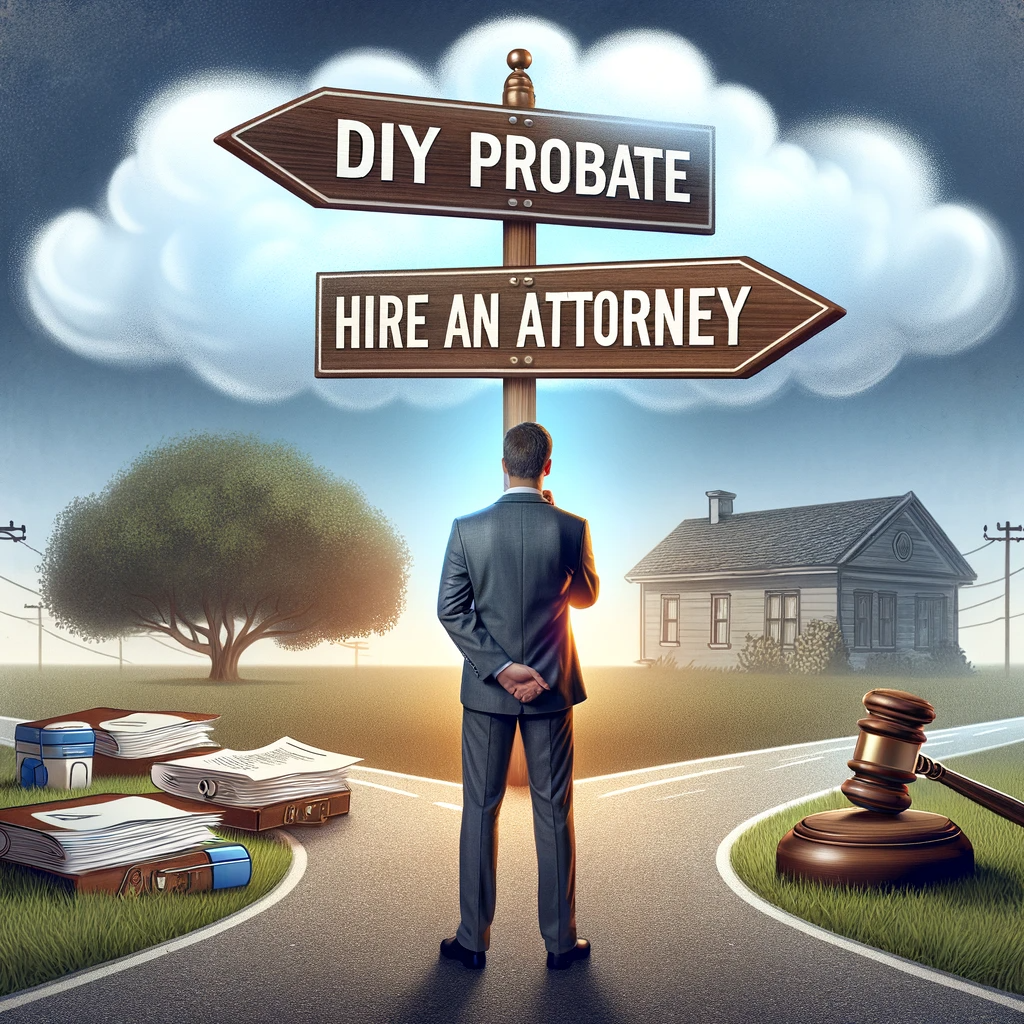Probate administration can be daunting, especially when you are coping with the loss of a loved one and the resulting changes in your life. The first call to a probate attorney is never easy, nor is thinking about the probate process. A question we sometimes hear from people during this time is whether they need to hire a probate attorney, if they can navigate the process on their own, or if they can skip the process all together.
Understanding the Probate Process
Probate is the legal process of administering the estate of a deceased person, ensuring that their assets are distributed according to their will or the state laws if there is no will. This process can take as little as a few months if there are limited assets and no property, or more than a year if there are complexities or disputes arise.
The probate administration process typically involves:
- Filing the Will: Locating and submitting the will to the court, if there is one.
- Appointment of Executor or Fiduciary: The court appoints someone to oversee the estate and carry out the decedent’s wishes based on appointment in the will or application of qualified fiduciary through a hearing if there is no will.
- Identifying and Valuing Assets: Determining the value of the assets, including property, bank accounts, and investments accounts.
- Paying Debts and Taxes: Settling any outstanding debts and taxes owed by the estate.
- Distributing Assets: Distributing the remaining assets to the heirs or beneficiaries.
You can read more details about probate administration here.
Factors to Consider
When deciding whether you should hire a probate attorney, you should consider the following:
-
Complexity of the Estate:
Pro Se Representation: If the estate is small, straightforward, and there are no disputes among heirs, handling probate without an attorney may be feasible. This is called pro se, and many people chose this route to save attorney’s fees if the estate has minimal assets.
Attorney Representation: For more complex estates, if property is involved, if there are business interests, or potential legal issues or family disputes, hiring an experienced attorney is highly advisable.
-
Financial Assets:
Pro Se Representation: In Connecticut, if the decedent’s solely owned assets include no real property, and are valued at less than $40,000 then this is known as a “Small Estate.” These classifications of estates require less paperwork and are often probated faster than Full Estates.
Attorney Representation: If property was solely or partially owned by the decent, if they had multiple investment accounts, various life insurance policies, or potential unknown creditors, hiring an attorney to take on the tasks related to determining the assets and completing the Inventory and CT-706 Form can save you countless hours and the risk of breach of fiduciary duty.
-
Understanding of Legal Procedures:
Pro Se Representation: Individuals with a legal or financial background or experience in estate matters may feel more confident navigating probate independently. If you were involved in the estate planning process of the decedent, you may feel more confident as you are familiar with their wishes.
Attorney Representation: If you’re unfamiliar with legal processes, financial accountings, or estate plan documents and prefer to protect yourself from potential claims, having an attorney can ensure all necessary steps are followed correctly and reduce the potential for error or delay.
-
Family Dynamics:
Pro Se Representation: Amicable families with open communication may find it easier to handle probate without external assistance.
Attorney Representation: If there is any potential dispute among family members, attorney representation for the Fiduciary, and even beneficiaries, is highly advisable. The Fiduciary, whether Executor or Administrator, is responsible for the accurate and lawful administration of the estate.
-
Time and Energy:
Pro Se Representation: Managing probate can be time-consuming over multiple months to years, requiring attention to detail and frequent court appearances. Having the time to complete forms, speak with financial institutions and appear in court will be required of the Fiduciary.
Attorney Representation: Hiring an attorney can alleviate some of the burden, allowing you to focus on grieving and other personal matters that may need to be attended to. While you will need to be in communication with your attorney, many of the tasks associated with contacting financial institutions, completing probate forms, and communicating with heirs or beneficiaries will be the responsibility of your attorney.
-
Litigation:
If there is a concern of potential litigation or dispute you should seek representation as soon as possible. Unfortunately, some fiduciaries attempt to manage a contested will themselves and realize the need for experienced representation after a court decree has been issued against their interest. At this point, you will face an uphill battle and possible probate appeal in the Superior Court. In probate court, there is often a maximum of 30 days to appeal a decree, and having an attorney familiar with the estate can help ensure deadlines are met.
While some individuals may successfully navigate the probate process without legal assistance, many find that the expertise of a probate attorney is invaluable, particularly in cases involving contested wills and the possibility of litigation. The decision ultimately depends on the unique circumstances of the estate and the comfort level of those involved. A free consultation with a probate attorney at Doyon & White Law Group can provide insight on what lies ahead for you in the probate administration process.
Disclaimer: The information provided in this blog is for general informational purposes only and should not be considered legal advice. Reading this blog does not create an attorney-client relationship with Doyon & White Law Group, PLLC or its attorneys. We make no warranties regarding the accuracy or completeness of the information. Any reliance on the content is at your own risk. For specific legal advice tailored to your situation, please consult with a qualified attorney. Doyon & White Law Group, PLLC and its authors are not liable for any damages or losses resulting from the use of this information.

